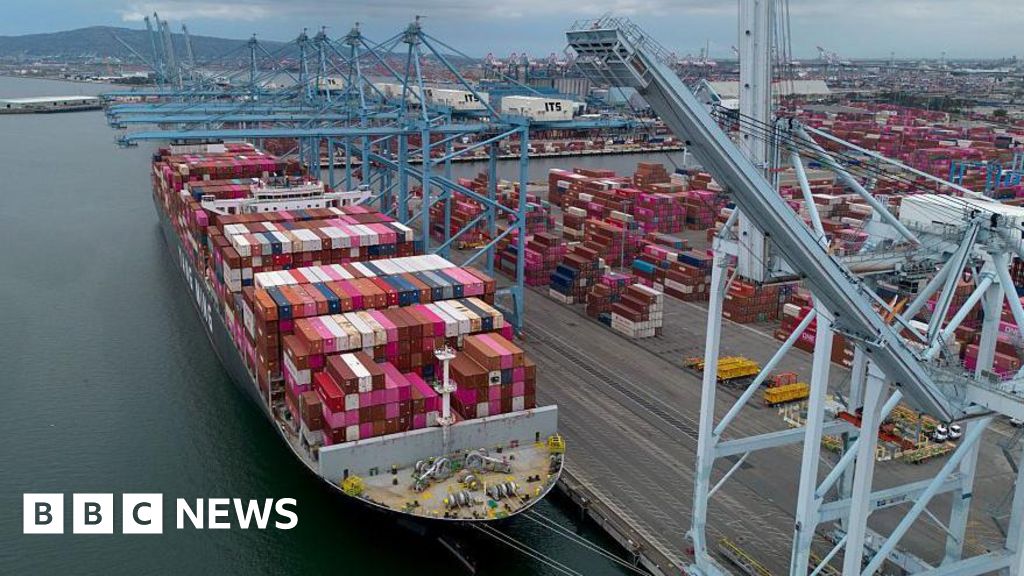ARTICLE AD BOX
By Karen Hoggan & Becky Morton
Business reporter

A normally busy Euston station was empty on Tuesday morning
All the advance publicity and media coverage about the biggest national rail strike in decades seems to have had an impact - with many passengers apparently heeding advice not to travel by train.
During the peak commuting time on Tuesday morning, many station concourses around the country were virtually empty.
At Manchester Piccadilly just before 07:00 BST there were more pigeons than people and the station shutters remained down, while it was a similar picture at Liverpool Lime Street as picket lines formed.
At Glasgow Central station, normally Scotland's busiest, the departure board and the concourse were empty at 05:30. ScotRail, which is not involved in the strike, cancelled 90% of its trains because it relies on staff from Network Rail.
In Wales fewer than 10% of normal services were running. In 2020 it was estimated that only 3% of commuting in Wales was by rail, compared with 10% on average across Britain and 45% in London. However drivers were warned to expect a surge in vehicles on the roads - and there were reports of slow traffic across Wales during the rush hour.
In London, there were very few people at normally heaving stations like Euston and King's Cross. But passengers who had chosen to travel were aware of the strikes, were well prepared and leaving extra time for their journeys.
Separately in the capital, London Underground workers were on strike over pensions and job losses, with services suspended on the vast majority of lines. According to Transport for London, by mid-morning the Tube had seen 80,000 entries and exits across the network, 95% down on last Tuesday.
Cars, bikes and WFH - what were the alternatives?
In London, Santander Cycle hire had surged by 46% by 10:00 on Tuesday compared with the previous day, while bus journeys were up by 7% as people sought alternative means to get around.
Some of those who opted to travel by taxi found themselves paying more. Uber users in London saw a surge in prices, with a three-mile journey from Paddington to King's Cross estimated to cost £27 at 08:45, according to the PA news agency. But, by 10:30 the charge had dropped down to just under £15.
Ride-hailing apps like Uber raise the price of journeys when demand spikes.
The AA said there were "traffic hotspots" on the M25 in south-east England, and on roads near London, Manchester, Leeds and Glasgow as people switched from the train to the roads.
Location technology firm TomTom said congestion levels at 11:00 were higher than at the same time last week in several urban areas.
However, the National Traffic Operations Centre for National Highways said motorways across England were marginally quieter than a normal Tuesday.
It spotted a busier peak at about 09:00 when there were reports of congestion around city centre car parks, but after that the situation became become quieter than normal.
One new factor in this rail strike was that many commuters are now set up to work from home if they need to.
So, although some bosses will no doubt have found it frustrating, it means the impact isn't as serious for some workers as it might have been in the past.
Frank Bird, a senior network planner at Highways England, said in the post-pandemic world people had come up with a much better Plan B when they can't get into work, and for many that means working from home rather than driving.
Who loses?
Not everyone can do their job remotely, and not everyone has the option to drive when trains aren't available.
Vivienne O'Connor, who lives in Ireland, managed to get the last train on Monday night to get to her cousin's funeral in England.
After getting the ferry to Holyhead, she caught the train to Wrexham, where a friend picked her up and drove her to Shropshire.
But now the strikes have left her stranded.
"The original intention was I was going to travel back after the funeral on Thursday, but obviously that can't now happen because there's no trains," she says.
"So I've had to rejiggle my arrangements. I'm staying with my brother - for who knows how many days until it gets sorted."
Vivienne O'Connor isn't sure how she'll get home from her cousin's funeral
Meanwhile, businesses have also been affected by commuters choosing to work from home.
Fabio Manara, who owns a coffee shop in Debden station in Essex, says the strikes have caused him to lose 80% of his business on Tuesday.
The shop is open six days a week and he expects to lose £300 per day due to the strikes.
"I opened two months before the pandemic and got help back then, but there's been so many strikes since then it makes it very hard," he said.
Another coffee shop owner, John Kelly, who is based at in Farncombe station in Surrey, says the strikes have been "disastrous" for him.
"70% of our business is from commuters and if we haven't got that… we're making coffee for ourselves and twiddling our thumbs," he says. "It's quite soul-destroying to be honest."
John Kelly says that the rail strikes are "soul-destroying" for his business
There's also a ripple effect on businesses based in city centres from workers staying home and leisure plans changing, with the hospitality industry among the worst hit.
UK Hospitality boss Kate Nicholls warned the strikes could cost the sector up to £540m.
Footfall in central London was 27% lower than last Tuesday as of 13:00, according to retail tracker Springboard. In city centres outside the capital, it was 11% lower.
However, footfall in outer London was less impacted, with a fall of only 6%, while for market towns it was down 2%. Diane Wehrle, Insights Director at Springboard, suggested the data reflected how it was easier for people working from home to visit their local high streets during the day.
The RMT union, whose members are striking, has apologised to passengers for the disruption.
However general secretary Mick Lynch says the union's members are "are leading the way for all workers in this country who are sick and tired of having their pay and conditions slashed".
The RMT and railway employers are due to hold fresh talks on Wednesday aimed at resolving the dispute, with the government and railway companies arguing the industry must modernise working practices to survive.
But with more strikes scheduled for Thursday and Saturday - and the rest of the week also affected due to the knock-on impact - the disruption for passengers is set to continue.
Additional reporting by BBC Transport Correspondent Katy Austin

 2 years ago
55
2 years ago
55








 English (US) ·
English (US) ·